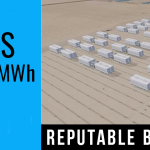
North Carolina’s draft Clean Energy Plan was published last week, including the retirement of 4GW of coal and putting in place measures to drive renewable energy and EV adoption in the US state.
Governor Roy Cooper gave an executive order in October of last year which made a commitment to “address climate change and transition to a clean energy economy”. Cooper’s order, Executive Order 80, stated that by 2025 North Carolina “will strive to accomplish” three key aims: reduce greenhouse gas (GHG) emissions to 40% below 2005 levels, to increase the adoption of electric vehicles (specifically, zero-emission vehicles) to “at least 80,000” and to reduce energy consumption in state-owned buildings by at least 40% from 2002 – 2003 baseline figures.
As instructed by Executive Order No.80, the North Carolina Department of Environmental Quality’s State Energy Office has now published a draft plan which supports those aims, open to a brief period of public comment until 9 September. The policy and recommended actions document looks at short term, medium term and long term objectives and measures.
For short term implementation – i.e. within two months of the plan’s introduction, the office recommended the creation of a revised state Clean Energy Standard should include specific targets for 2030, as well as creating new incentives and targets, which could consider newer technologies such as energy storage which have not previously been included. Better mechanisms to reward energy efficiency need to be considered.
There is also the question of retiring and replacing fossil fuel plants, particularly coal and the document calls for retirement dates to be given for North Carolina’s coal plants that are shown be rapidly becoming uneconomical to operate. The same goes for “uneconomical peaking power plants”, with cooperatives and municipalities to be given more power to replace those peaking gas plants with low or zero emissions sources that can provide the same services.





